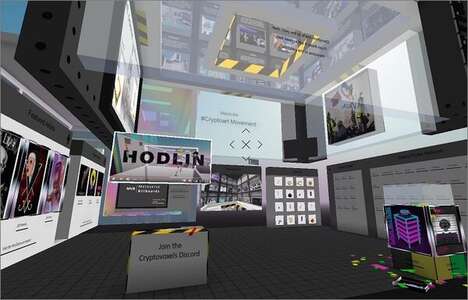Real Estate Marketing Tools
Related Trend Reports
Art & Design, Business, Design, Home, Lifestyle, Marketing, Multimedia, New Ventures
The real estate industry—traditionally relationship-driven and often slow to change—is undergoing a remarkable technological transformation in 2025. As digital-native buyers enter the market and post-pandemic shifts accelerate adoption, real estate marketing has evolved from simple property listings to immersive, data-driven experiences. With 96% of home buyers now starting their search online, innovative technologies have become essential tools rather than optional extras. The companies thriving in today's real estate market are strategically integrating them to enhance customer experience, streamline operations, and build trust.
AI and Personalization: The Smart Agent's Advantage
Artificial intelligence has transformed from buzzword to business essential in real estate marketing. Today's AI systems analyze vast datasets of customer behavior and preferences to deliver personalization at scale—a capability that most real estate professionals report helps them identify high-quality leads more efficiently.
The most visible application comes in the form of 24/7 conversational chatbots that engage users instantly, answering questions about listings, scheduling viewings, and providing mortgage estimates. This round-the-clock availability creates immediate connection with prospects while freeing human agents for higher-value interactions.
Beyond reactive service, AI's predictive capabilities give marketers unprecedented foresight. Advanced algorithms can forecast which properties a specific buyer is likely to be interested in, or which prospects are most likely to move or buy next. This predictive power enables proactive outreach at precisely the right moment, with personalized lead nurturing systems increasing sales conversion by up to 20%.
Perhaps most transformative is generative AI's impact on content creation. Major platforms like Matterport now offer AI features that generate professional listing descriptions in seconds. As one agent described using AI to draft listings: it provides "a great starting point" that saves "so much time," allowing professionals to focus more on strategy and client relationships than routine writing tasks.
Immersive Experiences: The New Open House
In 2025, the concept of "seeing" a property has been fundamentally redefined by immersive technologies. Virtual reality tours and interactive 3D walkthroughs have evolved from novelty to near-standard in property marketing, with profound impact on buyer engagement. Properties featuring 3D tours receive 87% more views than those without, and buyers are 95% more likely to call about a property when virtual tours are available.
This immersive approach extends beyond simple visualization. Augmented reality applications now allow potential buyers to point their smartphones at empty spaces and see digital overlays of furniture or renovations. This capability answers the crucial "what if" questions on the spot, helping clients visualize living in the space and significantly speeding up decision-making.
For developers and large-scale projects, digital twin technology represents the cutting edge of immersive marketing. These highly accurate virtual 3D models allow investors and buyers to interact with unbuilt or under-construction developments in a metaverse-like environment. The ROI is substantial—DAMAC Properties, for example, saw transactions associated with their digital twins grow from $24 million to over $400 million after implementation.
The strategic advantage is clear: immersive technologies create emotional connections to properties before physical visits, expand reach to remote or international buyers, and reduce days-on-market by enabling thorough exploration online. For business leaders, this underscores how sensory-rich digital experiences can drive engagement even for high-consideration purchases.
Data-Driven Decisions: Marketing by the Numbers
The intuition-based marketing of yesterday has given way to data-driven precision. Today's real estate professionals harness sophisticated analytics to understand market trends and buyer behavior at granular levels, optimizing every aspect of their marketing strategy.
AI-powered market analysis tools provide forecasts on property values and rental demand, helping agents price listings optimally and target the right demographics. Predictive analytics takes this further by scoring and prioritizing leads based on hundreds of signals—from search queries to credit score changes—identifying who is likely to move or which renters might become buyers.
This data-driven approach addresses a critical inefficiency in the industry, where historically as many as 48% of buyer leads received no follow-up. Today's predictive CRM systems automatically prioritize high-potential prospects and trigger appropriate nurturing sequences, ensuring no opportunity slips through the cracks.
The broader lesson for business leaders is clear: those who leverage data effectively gain a competitive edge, refining strategies based on evidence rather than assumptions. In real estate marketing, this means every decision—from ad buying to content creation—is optimized through continuous data feedback loops.
The Social Media and Short-Form Video Revolution
Real estate marketing in 2025 is as much about social presence as the property itself. Short-form video platforms like Instagram Reels, TikTok, and YouTube Shorts have become particularly powerful channels. These bite-sized videos drive exceptional engagement—social posts with video generate 1,200% more shares than text or images alone.
The impact on lead generation is substantial. Listings with video receive four times the amount of inquiries on average than those without, and buyers actively seek out social-savvy professionals—almost two-thirds say they're more likely to choose an agent with a strong social media presence. It's no wonder that most of real estate businesses now use social media for marketing outreach.
Live streaming open houses exemplifies this trend's effectiveness. By allowing dozens of prospects to "attend" an open house virtually and ask questions in real-time, these events not only widen the marketing funnel but also better qualify interest—someone who engages with a 10-minute live tour demonstrates meaningful intent.
The key insight for business leaders: social platforms aren't just for consumer brands. Real estate proves that even high-value, high-consideration products can be successfully marketed through creative social content. Authentic engagement and visual storytelling can humanize businesses and expand reach exponentially, regardless of industry.
Geospatial Marketing: Location Intelligence at Work
If real estate has always been about "location, location, location," marketing has now caught up. Geospatial marketing uses location data and analytics to target audiences with unprecedented precision.
Techniques like geofencing allow realtors to define virtual perimeters—perhaps a one-mile radius around a property or a competitor's open house—and trigger ads or notifications when potential buyers enter that zone. This ensures marketing messages reach people at exactly the right place and time, with nearly 90% of marketers reporting that location-based strategies boost sales.
Beyond simple proximity targeting, geographic information system (GIS) tools now visualize data such as school quality, crime rates, or commute times around listings. This transforms raw data into compelling selling points on interactive maps, helping market properties more effectively by highlighting local advantages.
The strategic takeaway is clear: mass marketing is giving way to precise, location-informed approaches. For any business, the ability to zero in on where target audiences are physically present, and deliver tailored content to them in that context, is a powerful tactic to drive conversion.
Strategic Integration: The Real Competitive Advantage
The real estate marketing landscape of 2025 demonstrates that true innovation comes not from adopting individual technologies but from their strategic integration. The most successful firms blend AI, immersive experiences, data analytics, blockchain, social media, and geospatial marketing into coherent strategies centered on customer experience.
This integration creates seamless journeys: a buyer might discover a property through a TikTok video, engage with an AI chatbot for initial questions, experience the space through VR, verify its history via blockchain, and receive location-based notifications when near similar properties—with each step feeding data back into systems that refine future engagement.
The business narrative is practical and results-oriented. Real estate firms are learning to operate more like tech companies, focusing on enhancing core business outcomes: more sales, faster transactions, improved customer trust, and lower costs. This transformation appeals particularly to the next generation of digital-native clients.
For business leaders across sectors, real estate's tech evolution offers a blueprint: sectors once slow to change can be transformed when technology adoption focuses on enhancing customer experience and operational efficiency rather than technology for its own sake.
The year 2025 marks a tipping point where technology in real estate marketing is no longer an add-on but a fundamental driver of value. Companies that thoughtfully integrate these innovations position themselves ahead of the curve in an increasingly competitive, digital-first market—a lesson applicable far beyond real estate.
For more industry insights, check out Trend Hunter's free 2025 Trend Report.


